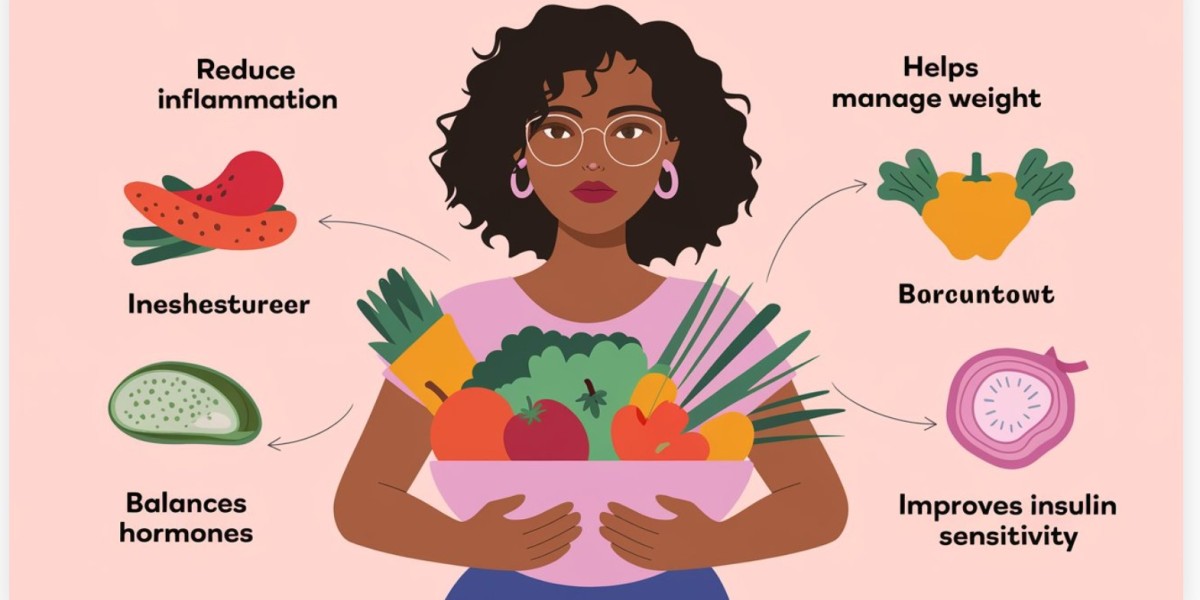Polycystic Ovary Syndrome (PCOS) is a common hormonal disorder affecting millions of women worldwide. Characterized by insulin resistance, irregular menstrual cycles, weight gain, and elevated androgen levels, PCOS can lead to long-term health complications like type 2 diabetes, cardiovascular disease, and infertility. While there is no cure for PCOS, dietary and lifestyle changes—particularly adopting a plant-based diet for PCOS, can significantly improve symptoms and restore hormonal balance.
How a Plant-Based Diet Helps Manage PCOS
1. Improves Insulin Sensitivity
Insulin resistance is a key factor in PCOS, leading to weight gain and increased testosterone production. A plant-based diet, rich in fiber and low in refined sugars, helps stabilize blood sugar levels. Whole grains, legumes, fruits, and vegetables have a low glycemic index (GI), reducing insulin spikes and improving metabolic health.
2. Reduces Inflammation
Chronic inflammation worsens PCOS symptoms. Animal products, especially processed meats and dairy, can trigger inflammatory responses. Plant-based foods, on the other hand, are rich in antioxidants, phytonutrients, and omega-3 fatty acids (from flaxseeds, chia seeds, and walnuts), which help reduce inflammation.
3. Supports Hormonal Balance
Dairy and meat often contain hormones that can disrupt endocrine function. A plant-based diet for PCOS eliminates these external hormonal influences while providing nutrients like magnesium, zinc, and vitamin B6, which support progesterone production and regulate menstrual cycles.
4. Aids in Weight Management
Many women with PCOS struggle with weight gain due to insulin resistance. Plant-based diets are naturally lower in calories and saturated fats while being high in fiber, promoting satiety and healthy weight loss. Studies show that women with PCOS who follow plant-based diets experience greater reductions in BMI and waist circumference.
5. Enhances Fertility
PCOS is a leading cause of infertility due to irregular ovulation. A plant-based diet for PCOS improves ovarian function by reducing insulin resistance and inflammation. Research suggests that women consuming more plant-based proteins (like lentils, beans, and tofu) have better fertility outcomes than those relying on animal proteins.
Key Foods to Include in a PCOS-Friendly Plant-Based Diet
Fiber-rich foods: Oats, quinoa, brown rice, sweet potatoes
Legumes: Lentils, chickpeas, black beans, edamame
Healthy fats: Avocados, nuts, seeds, olive oil
Leafy greens: Spinach, kale, Swiss chard
Cruciferous vegetables: Broccoli, cauliflower, Brussels sprouts (help with estrogen metabolism)
Berries & low-GI fruits: Blueberries, strawberries, apples, pears
Plant-based proteins: Tofu, tempeh, seitan, pea protein
Foods to Avoid or Limit
Dairy (linked to higher androgen levels)
Processed meats and red meat
Refined sugars and white flour
Fried and highly processed foods
Final Thoughts
Switching to a plant-based diet for PCOS can be a game-changer in managing symptoms by combating insulin resistance, reducing inflammation, and supporting hormonal balance. Combined with regular exercise, stress management, and adequate sleep, this dietary approach can lead to significant improvements in metabolic health, weight management, and fertility.
If you’re considering a plant-based diet for PCOS, consult a nutritionist to ensure you’re meeting all your micronutrient needs (such as iron, B12, and vitamin D). Small, sustainable changes can make a big difference in your PCOS journey!



